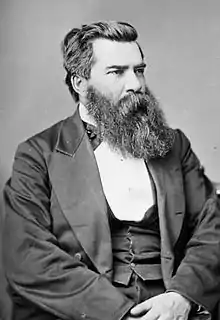Arthur Bunster | |
|---|---|
 | |
| Member of the Canadian Parliament for Vancouver | |
| In office 1874–1882 | |
| Preceded by | Francis Hincks |
| Succeeded by | David William Gordon |
| Member of the Legislative Assembly of British Columbia for Victoria District | |
| In office 1871–1874 | |
| Personal details | |
| Born | 1827 Country Queens (now Laois), Ireland |
| Died | 1891 (aged 59–60) San Francisco, California |
| Political party | Liberal |
| Other political affiliations | British Columbia Liberal Party |
| Spouse | Alinda Jane Pratt[1] |
Arthur Bunster (1831 – October 8, 1891[2][3]) was a Canadian entrepreneur and Member of Parliament.[4]
Bunster was born in Queen's County (now Laois), Ireland[4] and was educated in Dublin, attending Trinity College. He came to Vancouver Island in 1856 and settled in Victoria, British Columbia.[1] After trying his hand at several other ventures, Bunster purchased the Colonial Brewery in 1859.[5] The brewery was destroyed in a fire and rebuilt, both in 1869.
In 1869, he served as a member of the town council for Victoria.[4] He represented Nanaimo in the Legislative Council of British Columbia in 1871.[1] Bunster, a Liberal, was elected in the two-member Victoria riding in British Columbia's first provincial election, in 1871.[4] He was initially a candidate for the Vancouver seat (i.e. Vancouver Island, not today's City of Vancouver) in the federal election of 1872. However, Bunster and other local candidates stepped aside so that Minister of Finance Francis Hincks could win the seat by acclamation after he had lost his Ontario seat. Bunster did resign his seat in the provincial assembly in 1874 to contest[1] and win the seat in the 1874 federal election. He was re-elected in 1878 but ultimately lost the seat in 1882.[4] Bunster sold the brewery, to the original owners, in the same year. He later moved to San Francisco, where he entered real estate and later died in 1891, when he drowned in San Francisco Bay.[1]
Bunster was opposed to immigration by Chinese people to Canada. In 1871, he proposed that a fifty dollar poll tax be imposed on Chinese persons working in British Columbia. The proposal was withdrawn because it fell outside of the powers of the colonial council.[6] In 1874, he lobbied for legislation making it illegal for the Canadian Pacific Railway to hire persons with hair longer than 5.5 inches, a measure again aimed at the Chinese.[7]
Bunster is also remembered for his 1878 fist-fight in the House of Commons with Liberal MP Guillaume Cheval.[8]
References
- 1 2 3 4 5 Johnson, J.K. (1968). The Canadian Directory of Parliament 1867-1967. Public Archives of Canada.
- ↑ https://www.findagrave.com/memorial/188441709/arthur-bunster
- ↑ "Off Meiggs Wharf". San Francisco Call. No. Vol 70 Number 131. 9 October 1891. Retrieved 8 September 2021.
- 1 2 3 4 5 Arthur Bunster – Parliament of Canada biography
- ↑ "Pass the Jack O'Hearts" (PDF). Victoria Historical Society Publication. Victoria Historical Society. Summer 2007. Archived from the original (PDF) on 6 July 2011. Retrieved 21 September 2009.
- ↑ Walker, Barrington (2008). The History of Immigration and Racism in Canada: Essential Readings. Canadian Scholars' Press. p. 88. ISBN 978-1-55130-340-6. Retrieved 21 September 2009.
- ↑ Anderson, Christopher G. "The Senate and the Fight against the 1885 Chinese Immigration Act" (PDF). Parliament of Canada. Retrieved 21 September 2009.
- ↑ "Canadian Manners". The New Bloomfield, Pennsylvania Times. 16 April 1878. Retrieved 8 September 2021.